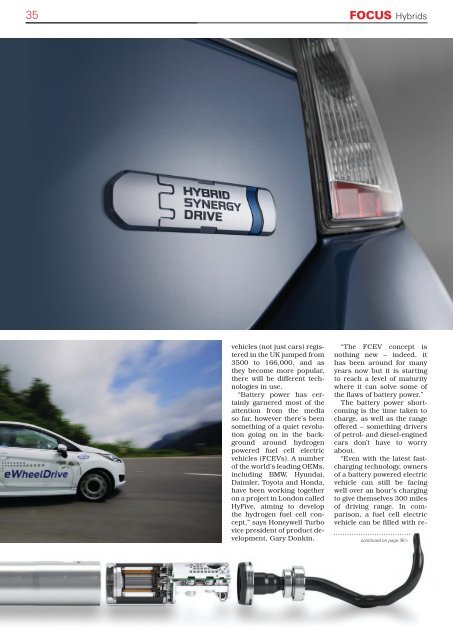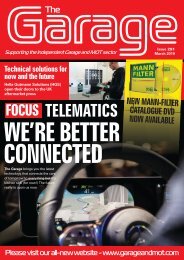Create successful ePaper yourself
Turn your PDF publications into a flip-book with our unique Google optimized e-Paper software.
35 FOCUS Hybrids<br />
vehicles (not just cars) registered<br />
in the UK jumped from<br />
3500 to 166,000, and as<br />
they become more popular,<br />
there will be different technologies<br />
in use.<br />
“Battery power has certainly<br />
garnered most of the<br />
attention from the media<br />
so far, however there’s been<br />
something of a quiet revolution<br />
going on in the background<br />
around hydrogen<br />
powered fuel cell electric<br />
vehicles (FCEVs). A number<br />
of the world’s leading OEMs,<br />
including BMW, Hyundai,<br />
Daimler, Toyota and Honda,<br />
have been working together<br />
on a project in London called<br />
HyFive, aiming to develop<br />
the hydrogen fuel cell concept,”<br />
says Honeywell Turbo<br />
vice president of product development,<br />
Gary Donkin.<br />
“<strong>The</strong> FCEV concept is<br />
nothing new – indeed, it<br />
has been around for many<br />
years now but it is starting<br />
to reach a level of maturity<br />
where it can solve some of<br />
the flaws of battery power.”<br />
<strong>The</strong> battery power shortcoming<br />
is the time taken to<br />
charge, as well as the range<br />
offered – something drivers<br />
of petrol- and diesel-engined<br />
cars don’t have to worry<br />
about.<br />
“Even with the latest fastcharging<br />
technology, owners<br />
of a battery powered electric<br />
vehicle can still be facing<br />
well over an hour’s charging<br />
to give themselves 300 miles<br />
of driving range. In comparison,<br />
a fuel cell electric<br />
vehicle can be filled with re-<br />
continued on page 36><br />
34, 35, 36, 37 Hybrids.indd 2 04/10/2018 11:21

















